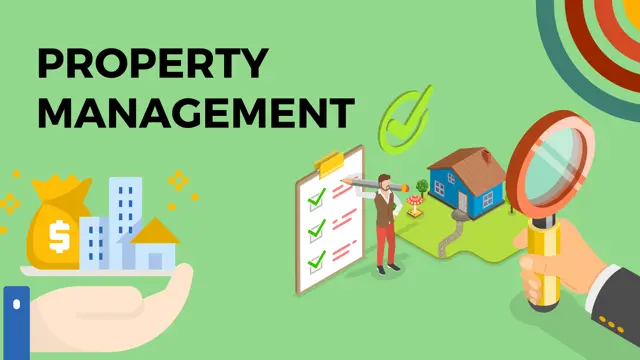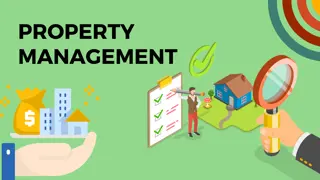
Property Development: Strategies for Real Estate Development
CPD Certified| Free PDF Certificate | Lifetime Access | Learner Support | No Hidden Fees | 100% Success Rate
EDURISE
Summary
- Reed Courses Certificate of Completion - Free
- Tutor is available to students
Add to basket or enquire
Overview
Property Management is a thriving field with a soaring demand for skilled professionals. If you're seeking a rewarding career, a thriving business opportunity, or to elevate your current role, here's why you should consider property management:
1. Booming Real Estate Market
- The real estate market is booming, and properties require efficient management. As a property manager, you play a pivotal role in ensuring landlords and tenants have a seamless experience.
- In the UK, the property sector is a major contributor to the economy, offering stability and growth opportunities.
2. Career Advancement
- Launch your career in property management or advance your current one. Start as a property assistant, leasing consultant, or maintenance coordinator, and progress to property manager, regional manager, or even executive roles.
- Property management is a dynamic field where you can continually grow and expand your responsibilities.
3. Thriving Business Prospects
- Entrepreneurial spirits can establish their property management firms. The demand for professional property managers is constant, and as a business owner, you can capitalize on this demand.
- Build a diverse portfolio of properties, generating substantial income through management fees and maintenance services.
4. Diverse Skill Set
- Property management hones various skills, from financial management and marketing to interpersonal and problem-solving skills. These skills are transferable and enhance your overall employability.
- Develop expertise in tenant relations, lease negotiations, and property maintenance, making you an invaluable asset.
5. Stability and Recession Resistance
- Property management offers stability even during economic downturns. Properties need management regardless of market conditions, ensuring a steady stream of opportunities and income.
- Adaptability is key. Property managers can navigate changing market conditions effectively.
Whether you're looking to embark on a fulfilling career, start a thriving property management business, or enhance your existing skills, property management is a strategic choice. Join this dynamic industry and become a sought-after property management expert. Your future in property management starts now.
Curriculum
Course media
Description
Learning Outcomes:
1. Profound Understanding of Property Management Principles
- After completing Module 1, learners will have a profound understanding of the fundamental principles and concepts of property management, laying a strong foundation for their career in this field.
2. Effective Property Marketing and Leasing Skills
- By the end of Module 2, participants will possess the skills to develop and execute comprehensive property marketing and leasing strategies, maximizing occupancy rates and rental income.
3. Expertise in Property Maintenance and Repairs
- Upon finishing Module 3, students will be proficient in property maintenance and repair management, ensuring properties are well-maintained and safe for tenants.
4. Financial Acumen in Property Accounting
- After Module 4, participants will have gained financial acumen and be capable of managing property accounting and financial aspects effectively, optimizing property investment returns.
5. Exceptional Landlord-Tenant Relations and Legal Knowledge
- Following Module 5 and Module 6, learners will excel in maintaining positive landlord-tenant relationships and navigating real estate laws and regulations. They'll be equipped to resolve disputes and ensure compliance with legal requirements.
Module 1: Introduction to Property Management
- Description: Module 1 provides a comprehensive introduction to property management, covering key concepts, roles, and responsibilities of property managers. Learners will gain insight into the importance of property management in real estate and its impact on property value and profitability.
Module 2: Property Marketing and Leasing
- Description: Module 2 delves into property marketing strategies, equipping participants with the skills to effectively market and lease properties. Topics include creating compelling property listings, conducting tenant screenings, and executing lease agreements.
Module 3: Property Maintenance and Repairs
- Description: In this module, participants explore property maintenance and repair best practices. They learn how to identify maintenance needs, plan for repairs, and ensure properties remain in optimal condition for tenants.
Module 4: Property Accounting and Financial Management
- Description: Module 4 focuses on property accounting and financial management. Participants acquire the knowledge and skills needed to manage property finances, including budgeting, rent collection, and financial reporting.
Module 5: Landlord-Tenant Relations
- Description: This module emphasizes the importance of positive landlord-tenant relationships. Learners gain insights into effective communication, conflict resolution, and tenant retention strategies to create a harmonious living environment.
Module 6: Real Estate Laws and Regulations
- Description: Module 6 provides a comprehensive overview of real estate laws and regulations. Participants explore legal requirements related to property management, ensuring compliance and mitigating legal risks in the field. Topics include fair housing laws, eviction processes, and property inspection regulations.
Who is this course for?
The ideal audience or target traffic for this Property Management course can be identified based on the curriculum's content and objectives. Here's a breakdown of the appropriate audience:
Aspiring Property Managers: Individuals looking to embark on a career in property management and seeking comprehensive training to build a strong foundation in the field.
Property Management Assistants and Coordinators: Professionals currently working in property management roles who want to enhance their knowledge and skills to advance in their careers.
Real Estate Professionals: Real estate agents, brokers, or professionals from related fields interested in expanding their expertise to include property management services.
Property Owners and Investors: Individuals who own or plan to invest in rental properties and want to learn how to effectively manage and maximize the profitability of their real estate assets.
Entrepreneurs in Property Management: Aspiring entrepreneurs looking to establish their own property management companies or startups in the real estate industry.
Landlords: Property owners who want to improve their property management skills, optimize tenant relationships, and ensure legal compliance.
Legal and Compliance Professionals: Professionals in legal and compliance roles seeking specialized knowledge in real estate laws and regulations related to property management.
Career Changers: Individuals considering a career change or transitioning into the real estate and property management field.
In summary, this course caters to a diverse audience interested in property management, including those looking to start or advance their careers, property owners seeking effective management strategies, and individuals interested in real estate law and compliance. It offers valuable knowledge and skills applicable to various aspects of property management and real estate.
Requirements
The Property Management Diploma has no formal entry requirements.
Career path
Begin your career as a Property Manager, with typical salaries in the UK ranging from £25,000 to £40,000 per year. Keep in mind that salary can vary based on factors like location and experience.
Specialize in property management within the real estate sector, expanding your opportunities and income potential. Your earnings may also increase as you gain expertise and clientele..
Questions and answers
Currently there are no Q&As for this course. Be the first to ask a question.
Certificates
Reed Courses Certificate of Completion
Digital certificate - Included
Will be downloadable when all lectures have been completed.
Reviews
Currently there are no reviews for this course. Be the first to leave a review.
Legal information
This course is advertised on reed.co.uk by the Course Provider, whose terms and conditions apply. Purchases are made directly from the Course Provider, and as such, content and materials are supplied by the Course Provider directly. Reed is acting as agent and not reseller in relation to this course. Reed's only responsibility is to facilitate your payment for the course. It is your responsibility to review and agree to the Course Provider's terms and conditions and satisfy yourself as to the suitability of the course you intend to purchase. Reed will not have any responsibility for the content of the course and/or associated materials.


